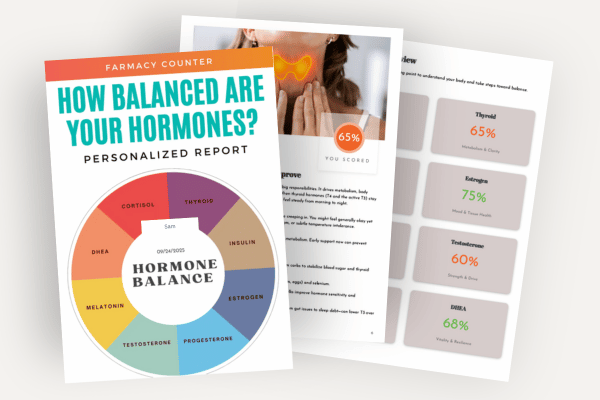
Mornings are more than just a transition from sleep to wakefulness—they’re a powerful signal to your body about whether the day feels safe, steady, and nourishing—or rushed, stressful, and chaotic.
In functional medicine, we talk about “hormonal communication.” The choices you make in the first hour of your day directly influence hormones like cortisol, insulin, and melatonin—the trio that shapes your energy, focus, and mood all day long.
If your energy is unpredictable, your focus fades before lunch, or your mood dips mid-morning, your morning habits might be sending the wrong signals to your hormones.
Here are three common habits that quietly throw your hormones off balance—and what to do instead.
1. Skipping Breakfast (or Just Grabbing Coffee)
Rushing out with only caffeine in your system may spike cortisol, your body’s stress hormone. Cortisol naturally peaks in the morning to help you wake up, but coffee on an empty stomach can push it even higher—leading to energy crashes, irritability, or sugar cravings later in the day.
Research from the Cleveland Clinic shows that drinking coffee before breakfast amplifies cortisol release, which may increase feelings of stress and jitteriness.
Instead:
Start with a simple, nourishing breakfast that balances protein, healthy fat, and fiber—the foundation for steady blood sugar and hormonal balance.
- Try an egg scramble with greens and avocado.
- Or warm oats topped with nuts, seeds, and berries.
If you want a warm morning beverage, consider green tea instead of coffee. Its gentle caffeine and catechins can provide a mild energy lift without spiking cortisol the way coffee can. Herbal teas like rooibos, chamomile, or ginger tea are even better for mornings when you want a truly calm start.

2. Scrolling Right After You Wake Up
Grabbing your phone first thing might feel automatic, but notifications and blue light confuse your brain and hormones.
Blue light suppresses melatonin, which regulates sleep and circadian rhythm. This disruption can throw off cortisol timing, appetite hormones like ghrelin and leptin, and even thyroid rhythm.
Instead:
Give yourself a screen-free buffer for the first 15–30 minutes.
- Open your curtains or step outside for natural light.
- Sunlight helps regulate your circadian rhythm, boosts serotonin, and naturally supports cortisol at the right time—helping you feel awake and focused without overstimulation.
A calmer start supports smoother hormonal communication throughout the day.

3. Forgetting to Hydrate
After 7–8 hours of sleep, your body is naturally dehydrated. Even mild dehydration can raise cortisol, slow digestion, and make blood sugar harder to stabilize.
Your adrenal glands, which regulate stress and energy, rely on steady hydration and electrolytes. When taxed first thing in the morning, hormonal balance can wobble for hours.
Instead:
- Drink a full glass of water before anything else.
- Add a pinch of sea salt or a squeeze of lemon for natural electrolytes.
- Only after hydrating and eating something nourishing, enjoy a gentle morning beverage like green or herbal tea.
This small ritual sets your adrenal rhythm and primes your hormones for a calmer, more balanced day.

Functional Medicine Insight: Why Mornings Matter
“Your morning sets your hormones’ rhythm for the day.”
The hypothalamic–pituitary–adrenal (HPA) axis—your body’s main stress communication system—takes cues from light, blood sugar, hydration, and mindset in the first hour after waking. Small, mindful changes can:
- Support healthy cortisol patterns (wake up alert, not anxious)
- Stabilize blood sugar for consistent energy
- Improve mood and focus through better neurotransmitter balance
- Support thyroid and reproductive hormone regulation over time
Bringing It All Together
You don’t need a complete morning overhaul. Just noticing which habits work against you is the first step toward hormonal balance.
- Eat before you caffeinate.
- Get light before you get screen time.
- Hydrate before you deplete.
These small shifts tell your body: It’s safe. You’re supported. When your body feels safe, your hormones can find their natural rhythm again.
Ready to See Where Your Hormones Stand?
If low energy, mood swings, or lingering stress have become the norm, it’s time to check your hormone rhythms.
👉 Take the “How Balanced Are Your Hormones?” Quiz here »
You’ll receive a free 13-page hormone report exploring eight key hormone systems through a functional medicine lens, including:
✅ A snapshot of your current hormone balance
✅ Insights into your energy, mood, sleep, metabolism, and reproductive health
✅ Functional medicine guidance to begin rebalancing naturally
Think of it as your roadmap back to alignment, helping you understand your body’s signals, restore hormonal harmony, and feel clear, steady, and strong from the inside out.

How Balanced are Your Hormones?
Take our 3-minute quiz to discover your unique hormone balance—and get a personalized 13-page report with insights and actionable steps to support energy, mood, sleep, metabolism, and reproductive health.






